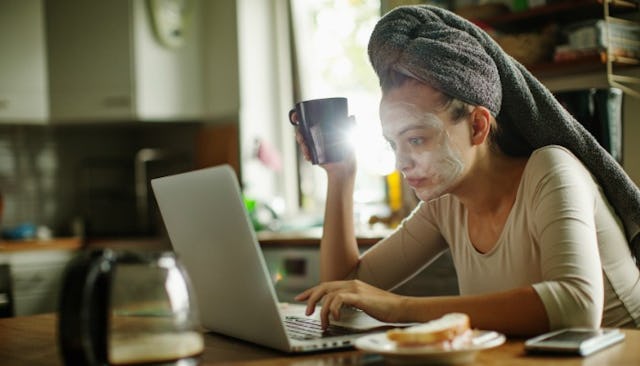Stop Asking Strangers Online To Diagnose Your Boob Problems

Boobs can be problematic. I’d never given mine much thought until my first lump appeared when I was just 21 years old. A second lump followed seven years later. Both were benign, thankfully. However, I found a third lump when I was 35. Like the other two, I promptly brought it to the attention of my gynecologist who ordered imaging. The initial ultrasound and mammogram showed a lump that appeared to be nothing. I had a nagging feeling something was wrong, and I sought a second opinion.
I was young, I had no family history of breast cancer, my BRCA1 and BRCA2 genetic tests were negative, and I didn’t have any common risk factors, yet cancer didn’t care. I was diagnosed with early stage breast cancer after a biopsy revealed malignant cells. The months that followed were full of appointments, a mastectomy, and a long surgical recovery. I just happened to become one of the 11% of women under age forty-five to have breast cancer. My journey taught me that never, ever should a woman attempt to self-diagnose her boob issues, including over the internet.
Weekly, I see women posting their breast issues in mommy groups. The woman will explain, in great detail, what she’s experiencing. Her post is predictable. She has a pain, a bump, discharge, or strange coloring. As soon as she posts, the responses pour in. Most of them are full of misinformation.
I know the information is wrong, but the poster may take it as fact. If she chooses not to further investigate by seeking medical attention and following her doctor’s recommendations, she could be ignoring her body’s warning signs that something is seriously wrong. Plugging one’s own ears, based on a social media comment, could have deadly results.
I don’t understand asking a group of thousands of strangers what to do about breast pain, appearance, or a lump. (This isn’t casual, like, what’s the best anti-wrinkle cream?) My guess is the poster is usually seeking reassurance that she should absolutely continue to live her life as usual and ignore whatever symptoms she’s experiencing. Of course, the problem is that no one responding to her post is an actual medical doctor—because they are all working and aren’t giving free medical advice over the internet.
I feel compelled to respond to these posts, because I have a sense of obligation based on my own experience. I didn’t know much about breast cancer, except that it’s represented by a pink ribbon and self-exams are important, before I was diagnosed. I understand not knowing exactly what to do next, and I empathize with trying to avoid completely freaking out. I always urge the person to see their doctor immediately, and I often share a summary of my own story.
Some of the responses the poster receives are beyond ridiculous. Just last week, I saw one woman respond to a “my boob is causing me pain” post by saying that she’s heard breast cancer doesn’t hurt. First, why is she giving medical advice based on something she’s heard? What? Often others will ask if the poster has breast cancer history in her family, or if she has the “breast cancer genes.” Though these are important factors a woman should discuss with her doctor, not all cancer cases are due to family history or positive genetic tests. In fact, only one in every five-hundred women are BRCA1 or BRCA 2 gene positive. Others ask her what “type” of breasts she has. I don’t even know what that means, exactly. How about the the type that could have cancer, and you’ll know for sure if you see a real medical doctor?
The best way to get unfounded reassurance and completely unreliable medical information is to post your breast problem questions in social media groups. If you want the real, scientific answers to your boob pain, appearance changes, nipple discharge, or that new lump, you need to go to your doctor and get imaging done—period.
Oh, and can we please talk about pseudo-science? It’s ridiculous to take it upon yourself to try any natural remedies based on the recommendations of internet strangers. Rubbing an essential oil droplet on your nipple isn’t going to rid you of cancer. Neither is a breast massage, a hot shower, a wait-and-see approach, wishful thinking, or positive vibes. You can smoke, rub, breathe, and chant all you want, but you’re just wasting your time. I would have much preferred to roll lavender oil on my boobs and then repeat a positive breast mantra than to have a mastectomy, but that’s not how it works.
I know. Going to a specialist and subsequent testing is expensive–very expensive. However, you have to ask yourself, is it worth your health (maybe even your life) to delay learning what’s going on in your body? Cancer doesn’t wait for you to work up your bravery, save up some money, or make time in your busy schedule. Cancer does what it damn well pleases.
Do this survivor a favor, because I believe you are worth it. Please take a few minutes once a month to do your self breast examination. Feel them and look at them. If you notice any changes, call your doctor immediately. Skip posting your findings on social media, and please, don’t take your worries to Dr. Google either. Your actual doctor can provide you with your next step.
This article was originally published on